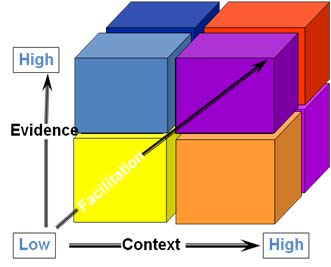Find out more...
IMPLEMENT@Bangor
Implementation Research Programme
Impact
Traditionally researchers have relied on publications at the end of studies to disseminate research findings. Implementation recognises that this approach has only limited success. Whilst we ensure that our research is actively disseminated through publications, conference presentations and other social media, we work with health care managers, clinical leaders and others to explore new ways of ensuring impact.
Some examples of how we approach impact are shown below.
Partnership Project Work
Our research partnerships are not confined to health care. New alliances with other public service providers are enabling us to find new ways to tackle different types of implementation challenges, and broaden the potential for impact.
IMPLEMENT@Bangor is collaborating with North Wales Police and the National Policing Improvement Agency to increase the use of evidence about effective policing solutions to anti-social behaviour across North Wales. The collaboration provides an excellent opportunity to share experience and expertise in tackling the challenge of implementing evidence of ‘what works’ across the health and policing services.
The collaboration is focusing on the use of the Promoting Action on Research Implementation in Health Services (PARIHS) framework, developed by IMPLEMENT@Bangor co-Director Professor Rycroft Malone. PARIHS asserts that for the implementation of evidence to be successful, synergy between the nature of evidence, the organisational contexts in which its implementation is planned, and the facilitation strategies designed to promote evidence use is required. Importantly, the collaboration will test the transferability of PARIHS to new policy arenas which have similar responsibilities for ensuring the effective and efficient use of public resources through using research evidence in service planning and delivery.
IMPLEMENT@Bangor is
currently leading a survey of the North Wales Police workforce which
will provide a theory-led overview of the nature of the implementation
context for research implementation in policing. Work with our partners
will ensure that appropriate implementation interventions are designed
to promote the use of effective solutions to anti-social behaviour.
Models, tools and activities
Promoting
Action on Research Implementation
in Health Services (PARIHS) Framework
Jo
Rycroft-Malone
This body of work has influenced the framing and conduct of implementation research and knowledge translation nationally and internationally. PARIHS is providing a guide to understanding implementation readiness, how to organise activity to increase the use of evidence in practice, policy and service delivery, and in the evaluation of such activity. PARIHS has found its way into a variety of settings and agencies in the form of consultancies, service delivery and organisation, policy and partnership research and exchange.

The Promoting Action on Research Implementation in Health Services (PARIHS) framework was developed inductively and has been subsequently refined over time. Successful implementation is represented as a function of the nature of evidence, the quality of the context of implementation, and appropriate approaches to facilitation: SI = f(E,C,F).
Click here to view the slideshow: 'What PARIHS is about'
| PHASE |
ACTIVITIES
AND RELATED PUBLICATIONS |
|
|
|
|
|
|
|
|
|
|
Impact
of publications
The Google Scholar citations for the following papers range from 295
to 118. The 2008 Implementation Science paper has been consistently
in the top 10 most accessed papers for the Journal, having been accessed
over 21,000 times.
Citations have been matched against the papers listed below. Many of
the citations go beyond ‘referencing’ and include empirical studies
that have applied the PARIHS framework – e.g. in the evaluation and
implementation of interventions, and to assess the success and challenges
associated with implementation.
Key papers
-
Kitson A, Rycroft-Malone J, Harvey G, McCormack B, Seers K, Titchen
A (2008) Evaluating the successful implementation of evidence into
practice using the PARIHS framework: Theoretical and practical challenges,
Implementation Science, 3(1), 7th January
2008 (157 citations, accessed over 21,000 times)
-
Rycroft-Malone J, Harvey G, Seers K, Kitson A. McCormack B, &
Titchen A. (2004) An exploration of the factors that influence the
implementation of evidence into practice. Journal of Clinical
Nursing, 13, 913-924 (265 citations)
-
Rycroft-Malone J, Seers K, Titchen A, Harvey G, Kitson A, McCormack
B (2004) What counts as evidence in evidence-based practice? Journal
of Advanced Nursing, 47(1): 81-90 (330 citations)
-
Rycroft-Malone J. (2004) The PARIHS framework – A framework for guiding
the implementation of evidence-based practice. Journal of Nursing
Care Quality, 19(4), 297-304. (158 citations)
-
Harvey G, Loftus-Hills A, Rycroft-Malone J, Titchen A, Kitson A, McCormack
B, Seers K (2002) Getting evidence into practice: the role and function
of facilitation. Journal of Advanced Nursing, 37(6):
577-588 (271 citations)
-
McCormack B, Kitson A, Harvey G, Rycroft-Malone J, Titchen A, Seers
K (2002) Getting evidence into practice: the meaning of context. Journal
of Advanced Nursing, 38(1): 94-104 (337 citations).
- Rycroft-Malone J, Kitson A, Harvey G, McCormack B, Seers K, Titchen A, Estabrooks C (2002) Ingredients for change: revisiting a conceptual framework. Quality in Healthcare, 11(2): 174-180. (339 citations)
Key users and beneficiaries - examples
North Wales Police and National Police Improvement Agency.
Approached by the NPIA and North Wales Police to collaborate on the
application of PARIHS to progress effective policing practice.
Veterans Administration – US – QUERI programme
– used the PARIHS framework as part of the organisation’s approach to
facilitating and evaluating quality improvement – e.g. A
Guide for applying a revised version of the PARIHS framework for implementation
Cheryl B Stetler, Laura J Damschroder, Christian D Helfrich, Hildi J
Hagedorn Implementation Science 2011, 6:99
Service delivery & practice development
- Used in the Greater Manchester CLAHRC – evidence in their documentation
as the framework of choice for organising their implementation activity.
